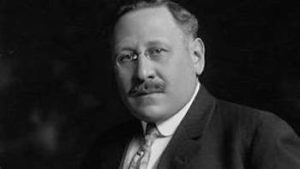
Julius Rosenwald
*Julius Rosenwald was born on this date in 1862. He was a white Jewish-American businessman and philanthropist.
Julius Rosenwald was born in Springfield, Illinois, just a few blocks from Abraham Lincoln’s home. His parents were Samuel Rosenwald, a clothier, and his wife, Augusta Hammerslough. They were a Jewish immigrant couple from Germany. By his sixteenth year, Rosenwald was apprenticed by his parents to his uncles in New York City to learn the clothing trades.
While in New York, he befriended Henry Goldman and Henry Morgenthau, Sr. With his younger brother Morris, Rosenwald started a clothing manufacturing company. They were ruined by a recession in 1885. Rosenwald had heard about other clothiers who had begun manufacturing clothing according to standardized sizes from data collected during the American Civil War. He decided to try the system that moved his manufacturing facility closer to the rural population, which he anticipated would be his market. He and his brother moved to Chicago, Illinois. Once in Chicago, the Rosenwald brothers enlisted more help from a cousin, Julius Weil; together, they founded Rosenwald and Weil Clothiers.
After the 1906 financial reorganization of Sears, Rosenwald became friends with Goldman Sachs's other senior partner, Paul J. Sachs, who often stayed with Rosenwald during his many trips to Chicago, and the two would discuss America's social situation, agreeing that the plight of African America was the most serious in the U.S. Sachs introduced Rosenwald to two prominent educators and proponents of African-American education, William H. Baldwin and Booker T. Washington. Rosenwald made common cause with Washington and was asked to serve on the board of directors of the Tuskegee Institute in 1912, a position he held for the remainder of his life.
He endowed the institute to free Washington from fundraising, enabling him to devote more time to managing the institute. Rosenwald became a member of the city's leading Jewish Reform congregation, the Chicago Sinai congregation, soon after moving to Chicago. Its rabbi, Emil G. Hirsch, greatly impacted Rosenwald's philanthropy. Rosenwald donated generously to several Jewish community projects in Chicago and served as vice president of Chicago Sinai for many years. Washington encouraged Rosenwald to address the poor state of Black education in the US, which suffered from inadequate buildings and materials. In his words, written in 1911: The horrors that are due to race prejudice come home to the Jew more forcefully than to others of the white race, on account of the centuries of persecution which they have suffered and still suffer.
Rosenwald provided funds to build six small schools in rural Alabama, constructed and opened in 1913 and 1914 and overseen by Tuskegee. As the projects were built by and for Blacks, they showed Rosenwald's intention to remain behind the scenes in this effort. Inspired by the social progressivism of Jane Addams, Grace Abbott, Sachs, and the Reform Judaism of Hirsch and Julian Mack (many of whom were personal friends), Rosenwald devoted his time, energy, and money to philanthropy.
He established his Rosenwald Fund in 1917 for "the well-being of mankind." Unlike other endowed foundations, which were designed to fund themselves in perpetuity, the Rosenwald Fund was intended to use all of its funds for philanthropic purposes. As a result, the fund was completely spent by 1948. His fund, called the Rosenwald School Project, donated over $70 million to public schools, colleges and universities, museums, Jewish charities, and Black institutions.
The rural school building program was one of the largest administered by the Rosenwald Fund. It contributed over $4 million in matching funds to construct more than 5,000 schools, shops, and teachers' homes in the South, which became informally known as "Rosenwald Schools."
He commissioned one of Chicago's largest philanthropic housing developments: the Michigan Boulevard Garden Apartments at 47th St. and Michigan Ave. The Michigan Boulevard Garden Apartments was one of the first American housing developments to mix residential, commercial, and social uses and still stands. The complex was built in 1929 by Rosenwald and his nephew. Covering a square block, the buildings enclosed an enormous central landscaped courtyard. He planned the development of 421 units to provide sound housing for Blacks and to relieve the tremendous overcrowding due to Chicago's pervasive racial segregation. The development also included 14 stores along the 47th Street side of the property, four occupied by black-owned businesses, and a nursery school. Rosenwald invested $2.7 million in the project, receiving only a 2.4 percent return during the first seven years.
Rosenwald supported the Wabash Avenue YMCA, which opened in 1914 and would later become a historic landmark. The Wabash "Y" greatly aided Blacks' integration into Chicago during the Great Migration. It is still operating today. He also gave $1000 in grants to the first 100 counties in the U.S. to hire County Extension Agents, helping the Department of Agriculture launch a highly valuable program for rural Americans. He was also the principal founder and backer of the Museum of Science and Industry in Chicago, to which he gave over $5 million and served as the president for five years.
Julius Rosenwald died at his home in the Ravinia section of Highland Park, Illinois, on January 6, 1932. The collaboration between Washington and Rosenwald was the subject of the 2015 documentary Rosenwald, subtitled The Remarkable Story of a Jewish Partnership with African American Communities, which won the Best Documentary Jury Award at the Teaneck International Film Festival and the Lipscomb University Prize of the Ecumenical Jury, Nashville Film Festival.